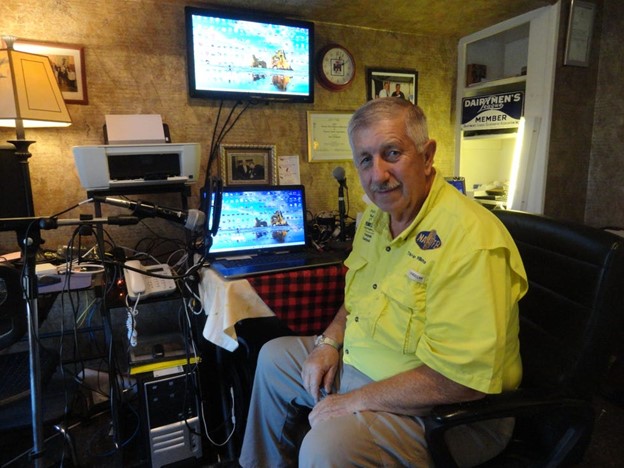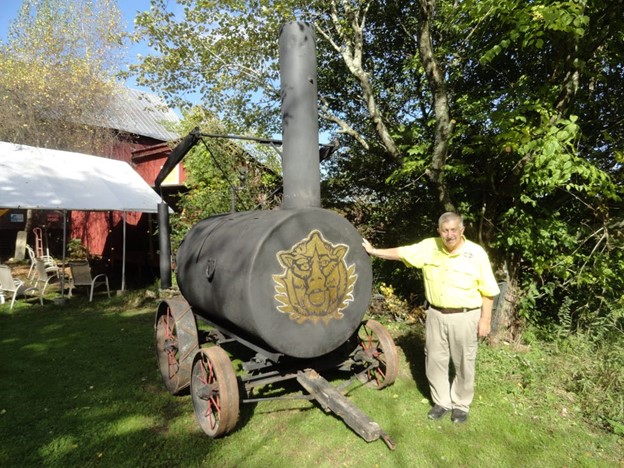 (Editor’s Note: We thank the Tri-County Independent of Honesdale, Pennsylvania, for granting permission to reprint this in-depth article, written by Peter Becker, on NAFB Member Dave Williams. Photos by Peter Becker, Tri-County Independent.)
(Editor’s Note: We thank the Tri-County Independent of Honesdale, Pennsylvania, for granting permission to reprint this in-depth article, written by Peter Becker, on NAFB Member Dave Williams. Photos by Peter Becker, Tri-County Independent.)
CHERRY RIDGE — He’s a voice for agriculture across Pennsylvania and beyond, airing daily on as many as 30 radio stations and three networks, and weekly on PCN-TV. Dave Williams’ broadcasts emanate from none other than the farmhouse of his family’s five-generation farm in Wayne County.
He is the owner of the Pennsylvania Farm Country & American Farm Country Radio Network as well as producer of Pennsylvania Country Roads TV with a combined audience of as many as 5 million people.
Although not actively milking cows anymore, Williams is very active in agriculture. Out and about with his microphone and camera, he is supporting the rural quality of life so very much a part of the hills and dales of the Keystone State, defending the cause of what in many ways is a long struggle for the family farm in the modern economy.
He’s been doing this for 23 years; and recently, he celebrated this with a down-home barbeque cooked on his unique Stourbridge Lion locomotive cooker he built some 25 years ago. His invited guests were many of his friends he has made statewide who encouraged him along the way, making what may seem an unlikely journey possible.
As he said, “One thing just led to the other.” Williams was not a broadcaster before this.
He took over the herd of about 30 dairy cows when he was 12 and was active with 4-H until he went into the military. After the service, he spent three years in Texas helping to manage a 5,000-acre cattle ranch, a huge contrast to his small dairy where he was raised. He married his late wife, Melba, and together they leased a 50-acre mule farm while he was working in the oil-drilling business.
All along, he never lost his heart and passion for his roots and the people who know the hard work, uncertainties, and joys of bringing in a harvest, tending livestock, and raising food, or whose job is in any one of sundry ag-supporting businesses.
“I guess he liked my voice”
Williams never expected to have the privilege of being a farm broadcaster nor would have dreamed that in his very childhood bedroom one day he’d set it up as a broadcast studio.
When they came back to Wayne County, he worked as a fleet manager selling trucks while doing some farming on weekends, raising sheep and cows. He became president of the Pocono Mountains Antique Farm Association, doing shows, including at the GDS Fair and Wayne County Fair.
Living back at the family farm in Cherry Ridge, he was raising beef and later switched to growing hay and vegetables. His fields are still used for haying.
Then one day, Marlyn Shaffer, who was an officer with the Wayne County Farm Bureau, approached him and asked him to do a radio show on Honesdale’s radio station WDNH (as it was known then). Shaffer was part of the antique machinery club with Williams.
He was taken by surprise.
“I guess he liked my voice,” Williams said.
This was in the fall of 1998.
He brought the proposal to Bob Mermell, the owner of the broadcasting company. Mermell agreed to air the show but said they tried a farming program some years before and it hadn't worked out. The issue, Williams said, was that the earlier try was targeting only the farmers and issues specific to them and lacked a broader appeal. Williams wanted to involve the consumers, who actually buy and eat the food so they could understand and be involved.
On his very first show on WDNH-AM 1590, his guest was Leroy Van Dyke, a popular country singer. On subsequent shows he would interview state and federal legislators, governors, state ag officials, and —of course — he has had “a lot of farm family stories.”
Farmers’ stories
Williams said the “heartland stories” from the farmers themselves have been most effective, telling their joys and sorrows and letting the consumers know what they are up against. It wasn’t easy at first getting the farmers to open up. An independent lot, they traditionally don’t say a lot, Williams indicated, but he was able to gain their trust.
They found he is one of them and had a friend who understands and was willing to be their voice.
About 17 years ago, Williams became an officer and later a state director for the Pennsylvania Farm Bureau. He became a state delegate for the American Farm Bureau Foundation.
While at the American Farm Bureau Convention in North Carolina, he met Orion Samuelson, who then hosted U.S. Farm Report, a weekly television news magazine dedicated to agriculture. Samuelson also was a long-time chief agriculture broadcaster for WGN Chicago. Williams interviewed him for his own show.
“He said I needed to be a national farm broadcaster. I didn’t know what that meant,” Williams admitted.
Williams joined the National Association of Farm Broadcasting (NAFB), described as an organization dedicated to serving the interest of the agricultural community and creating value for its member broadcast stations and networks.
Both Samuelson and Max Armstrong, another agriculture broadcaster who partnered many years with Samuelson, went on Williams’ radio show. By now, his show had expanded to about a dozen radio stations in northeast and north-central Pennsylvania.
 Farm TV broadcasting
Farm TV broadcasting
He also met Mark Oppold, who at the time was news director for RFD-TV. This is the flagship network of Rural Media Group and the nation’s first 24-hour television network focused on agribusiness, equine and rural lifestyles, and traditional country music and entertainment.
Williams, who until this time was only doing radio, started doing work for RFD-TV.
Each January, Williams has been sure to cover the week-long Pennsylvania Farm Show near Harrisburg. Penn State University had been doing a radio show at this event but suddenly pulled out of the segment. The show manager then asked Williams to take it over. Williams started doing six radio shows a day at the Pennsylvania Farm Show as well as a television segment for RFD-TV.
He said the Pennsylvania Farm Show officials have treated him very well. To complete his programming, he was set up right next to Pennsylvania Cable Network (PCN) so he could share the internet connection, so he became well-acquainted with the people at PCN.
The radio show kept growing as did his sponsors. Another open door came with PCN three years ago when the network offered Williams a chance to do his own show on PCN. He said they had seen his work on RFD-TV and thought he’d be a good fit.
Around this time, his beloved wife died in 2018; and, for Williams, he needed more to do to keep occupied. He said Melba was a big supporter of him and did his books.
The program on PCN, Pennsylvania Country Roads TV, gained some important sponsors, including Cabot Oil & Gas, Pennsylvania Farm Bureau, AgChoice Farm Credit, and the Pennsylvania Soybean Board.
His show on PCN brings a potential audience of 3.5 million, on top of the 2 million who can tune in to hear the radio programs. Locally, he is aired on several radio frequencies by Bold Gold Media Group.
At RFD-TV, he learned some pointers, but mostly Williams learned how to put a television program together by trial and error, perfecting it as he went along, watching what others do. He does his own editing and adds appropriate background music, making it quite professional.
Much of the time, he is on the road, attending fairs and festivals, and agricultural events, covering subjects related to local and regional history. Interviews he does with his TV camera are edited and adapted to use on his radio shows as well. In addition to PCN-TV, he still reports for RFD-TV.
Sometimes, Williams has something humorous and heart-warming, like a video he did about a calf being born. His camera was on the people watching the blessed event, to catch their expressions as a new cow has come into the world.
The lockdown in 2020 related to COVID-19 meant fewer events to cover. Many broadcasters resorted to re-runs, but Williams has kept up the pace with new programming. He does four or five new segments each week.
One thing that kept him busy through COVID, he said, was getting out and talking to farmers about how they were coping and their views about vaccines. Williams avoids political subjects.
Early morning fare
Williams’ radio and TV shows tend to be early morning fare, slots given him by the broadcasters. He said the time slots are popular with commuters and also for those who start their chores early on the farm.
The farmers, he said, relate to him and feel comfortable opening up.
“It was not so in the beginning,” he said. “My reputation grew. They know I’m not doing it for the money but to help people.”
Williams found people like to talk about a subject they know about, and to talk about themselves. Before the video starts, he spends some time with them just talking, making them feel at ease.
“I tell them it’s like sitting on the back porch talking,” he said. “Some actually take me out to the back porch.”
Bring hope
Asked how he has dealt with his rise in his career and outreach, Williams reflected and shared.
“I don’t do it to make a big deal about me, but I do it because I care about the people. I was raised in farming, and I grew to really care about people. What really makes the show is the people sharing their stories, the sorrows, and the good times. I hope it makes some difference and inspires the younger generation. It gives them hope.”
Many honors and awards have come his way for his farm-broadcast work. One of those special times of recognition was the day Governor Ed Rendell designated August as Pennsylvania Agri-Tourism Month in Williams’ honor. Williams commented it’s not about who gets the award but the people who make it happen, and who is really deserving of awards are the farm families.
At the 23rd anniversary barbeque, Brian Smith, a Damascus Township farmer who happens to be a Wayne County Commissioner, was there with his group playing some country songs. Smith bragged to the other guests about how Williams helped bring Future Farmers of America (FFA) and an agricultural curriculum back to Honesdale High School, something no one would have thought possible.
Williams later explained he had invited Michael Brammer, who was executive manager of Pennsylvania FFA at the time, to come and speak at Wayne County Ag Day, an annual public event held at Honesdale High School. The local school board learned of it, and Williams said they realized what they were missing at the school district.
“I was just one person in the group. It’s not about who gets credit, but it’s about getting it done,” he stressed.
